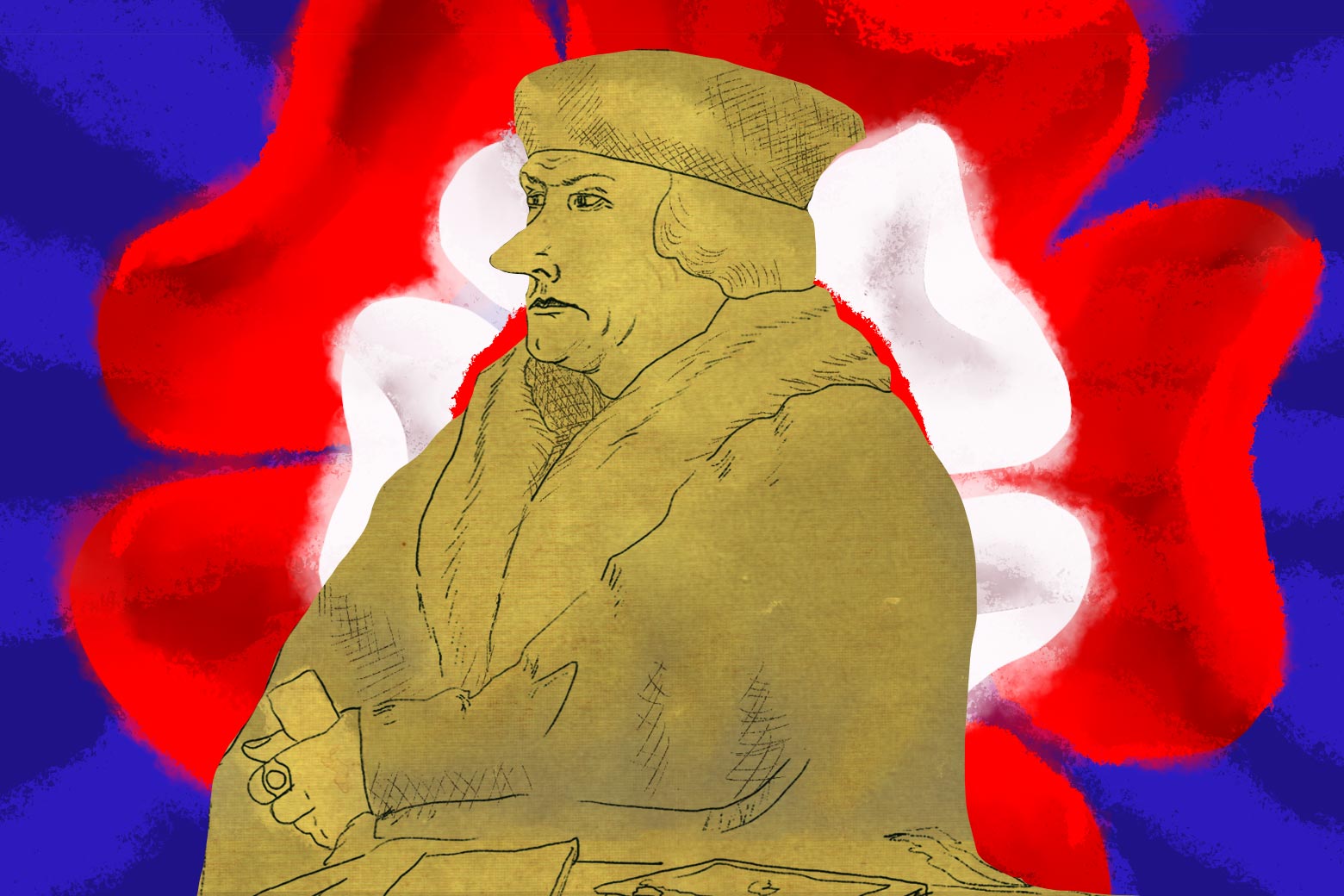Slate has relationships with various online retailers. If you buy something through our links, Slate may earn an affiliate commission. We update links when possible, but note that deals can expire and all prices are subject to change. All prices were up to date at the time of publication.
“I am in awe of myself,” admits Thomas Cromwell in Hilary Mantel’s The Mirror and the Light, her third and final novel in a series that’s transformed the popular understanding of the Elizabethan statesman’s life. “I never know what I will do next.” The first two books in the trilogy, 2009’s Wolf Hall and 2012’s Bring Up the Bodies, both Booker Prize winners, were propelled by the force that inspired that awe: Cromwell’s seemingly unstoppable will. Born the son of drunken, abusive, provincial blacksmith, by 1536, when The Mirror and the Light begins, Cromwell has become “the second man in England” after Henry VIII, the king’s closest adviser and feared fixer, as well as viceregent of the fledgling Church of England. His rise has been unprecedented and, for the realm’s oldest families, confounding.
However, no reader needs the foreshadowing remarks of Cromwell’s enemies (and a few of his friends) to remind her where all this will end: Cromwell was executed for treason and heresy at the Tower of London in 1540. Even at the peak of his power, Cromwell himself admits that he is the monarch’s utter dependent: “What have I, but what my king gives me? Who am I, but who he has made me?” he remarks when a friend passes along rumors of disloyalty. But he’s also gotten cocky, filling a volume he titles The Book Called Henry with advice on how to handle the king. He’s become less circumspect about reproving the manners of high-born courtiers around him—and despite their pride in their own chivalry, they are indeed a boorish lot. He is enviably rich as well as powerful, possesses a fine and ever-expanding house in London, and has bought himself a striped African cat from a Damascene merchant “for a price you would not believe.” In the novel’s first chapter, the beast gets out and climbs up a tree, where she seems perfectly at home. Cromwell identifies: “I have travelled so far to get here, and nothing they do disturbs me now, nor disquiets me, high on my branch.” There is less excitement in the view from that perch than there is in the climb to get there, and so The Mirror and the Light, at more than 750 pages, is a novel with a lot less narrative drive than its predecessors—no matter how false Cromwell’s sense of security, or how ominous the doom that closes in on him.
Being no fool, Cromwell also sometimes thinks of Icarus—or more specifically, of the boy’s father, who built the wings that carried his son too high. “Why do we blame Daedalus for the fall,” he asks himself, “and only remember his failures? He invented the saw, the hatchet and the plumbline. He built the Cretan labyrinth.” Mantel’s novels have advanced just such a defense of Cromwell, often depicted (particularly in Robert Bolt’s 1960 play, A Man for All Seasons) as an unprincipled power seeker. Cromwell relieved Henry of two inconvenient wives, Katherine of Aragon and Anne Boleyn, and engineered England’s split from the Roman Catholic Church. In Mantel’s novel, he has dragged his nation out of the Middle Ages and single-handedly embodies the superiority of meritocracy over aristocracy. “What will you do without me?” he demands of his noble interrogators in the Tower at the end. “Within a year the king will be fighting the Scots, or the French, or likely both, and he will bankrupt us. None of you can manage matters as I can.” (Indeed, the fickle Henry soon regretted the execution of “the most faithful servant he had ever had.”)
Wolf Hall is organized around Cromwell’s efforts to rid Henry of Katherine, while Bring Up the Bodies describes the rise and Cromwell-designed fall of Anne Boleyn. The latter takes a character that Mantel has spent hundreds of pages building up as sympathetic and shows him framing five men as Boleyn’s lovers and overseeing their deaths. To free the king of Anne, Cromwell knows, he needs guilty men, “so he has found men who are guilty. Though perhaps not guilty as charged.” The five are responsible for a satirical play performed for the court in mockery of Cardinal Wolsey, Cromwell’s conspired-against, fallen, and much-mourned mentor. Mantel’s Cromwell is nothing if not constant, loyal to the cardinal years after his death and willing to risk his own skin to save the life of Mary Tudor, Henry’s daughter by Katherine, because in a moment of weakness, he promised the former queen that he would look after the girl.

If Cromwell’s intriguing against two women helps to make his fortune in the first two novels, it is his good deeds that help to undo him in the third. In one slant of light, this is a story of classical hubris, and in another it is a pitch-black reminder that if you’re going to be amoral, you’d best go all the way. Cromwell, who’s read everything, has read Machiavelli, but without wholly espousing him. His heroic campaign to persuade the stubborn Mary that she must publicly concede her own illegitimacy and forswear her Catholic faith prevents Henry from having her executed for treason—“a great crime,” in Cromwell’s eyes, and one that he knows would haunt the monarch’s conscience. But that campaign only makes him vulnerable to rumors that he wants to marry Mary as a means of taking the throne for himself. The same goes for his defense of the king’s niece, who falls in love with and secretly weds a poor and talentless poet, interfering with her uncle’s plans for an advantageous marriage; that leads to still more rumors. And if Cromwell were only as ruthless as he is reputed to be, then he would have crushed the irascible Duke of Norfolk, who eventually conspires in his downfall. Cromwell takes in ambitious protégés who later betray him. Even his many charitable acts, such as handing out food to the poor, inflame his aristocratic enemies as the gestures of a bogus, jumped-up “great man.”
Cromwell’s fate lends itself to many interpretations, some of them more timely than others—or perhaps just more perennial. Mantel’s dashes of anachronistic language—the great 16th-century portraitist Hans Holbein is described as never missing a chance “to market his genius,” a thoroughly modern usage of both those words—encourages readers to view her characters as prototypes of ourselves, not the same at heart, but an early draft. Her Cromwell is a committed “gospeller,” a Protestant who wants to wrench Christianity out of the hands of corrupt clerics and deliver it to each believer’s individual, educated conscience:
The English will see God in daylight, not hidden in a cloud of incense; they will hear his word from a minister who faces them, instead of turning his back and muttering in a foreign tongue. … The faithful will cherish their Savior in their inner heart, instead of gawping at him painted above their heads, like a swinging inn sign. We will break the shrines, Hugh Latimer says, and found schools.
This fervor leads Cromwell into a great mistake: persuading Henry to marry Anne of Cleves after the death of Jane Seymour, as a way to cement an alliance with German Protestants against the Catholic rulers of France and the Holy Roman Empire. It might have been a strategic triumph but for the fickleness of the king Cromwell served: Henry famously found Anne so unattractive he felt unable to consummate the union (although Mantel makes the initial rejection Anne’s). It was a rare misstep for Cromwell, a man who, as the famous quote from Wolf Hall puts it, “is at home in courtroom and waterfront, bishop’s palace or inn yard. He can draft a contract, train a falcon, draw a map, stop a street fight, furnish a house and fix a jury.”
Cromwell anticipates the obsolescence of the old class system that places one man over another solely because of his “high” birth and that exalts the pursuits of the aristocracy over more productive occupations. “Chivalry’s day is over,” he thinks in Bring Up the Bodies. “One day soon moss will grow in the tilt yard. The days of the money lender have arrived, and the days of the swaggering privateer; banker sits down with banker, and the kings are their waiting boys.” But to get there, to prove that he is a better man than any Howard or Fitzwilliam, Cromwell needs to manage Henry, an unpredictable creature of a species—princes—that Cromwell suspects may be beyond human. A prince, he avers, is “made of shards and broken fragments of the past, of prophecies and of the dreams of his ancestral line”—not so much a man as a totem, “half god, half beast.”
Despite his humble roots, Mantel’s Cromwell—a rootless, multilingual cosmopolitan who has thrived in both Italy and Antwerp—is no populist. In 1536, an uprising in the north known as the Pilgrimage of Grace threatened Henry’s authority with calls for a return to Catholicism and the preservation and restoration of monasteries the crown was in the process of dissolving. Aristocratic sympathizers grafted on protests at the elevation of the baseborn—namely Cromwell—to high offices. Mantel’s Cromwell has no compunction about brutally putting the rebels down. Their resistance arises merely from habit, superstition, and a fondness for a calendar full of work-free saint’s days. “The common folk of England,” he observes, “live on songs and tales and alehouse jokes. Spending their pence on candles to burn before holy images, they live in the dark, and in the dark take fright.” They claim an absurdly irrational devotion to the very king whose reforms they long to tear down. They don’t know what’s good for them.
Cromwell, it seems, could have written a book called What’s the Matter With Yorkshire? It is self-evident to him, and no doubt to many of Mantel’s readers, that he is the best qualified to run the country. He is smarter, more competent, and despite what his detractors claim, more merciful than anyone in the class that currently monopolizes the job. But there is an imponderable, atavistic element to ruling that he lacks. “No one would follow you,” the emperor’s ambassador tells him. “Not even the Londoners. They want noble captains. In Italy there are charcoal-burners and ostlers who have founded honourable houses and left great names. But England has its own rules.” He allows himself to believe that he is like that wild African cat—a beast like Henry—but he’s mistaken. He doesn’t even really own the creature, and the moment he forgets this is the moment he begins to fall.
The Mirror and the Light
By Hilary Mantel. Henry Holt.
If only this narrative—or the tragic one, or the Machiavellian one—were easier to discern in the many pages of The Mirror and the Light. The novel bogs down with portentous conversations and remodeling plans and municipal updates and protocol. Cromwell faltering hasn’t the power to bind all these details together the way that Cromwell ascendant did. Wolf Hall was exhilaratingly confident in rewriting its main character as a hero; each new piece of the identity he assembled for himself held its own fascination. Bring Up the Bodies, its action compressed into a much shorter time span, pitched him into moral peril and made Mantel’s readers wonder how well we really knew him. The Cromwell of The Mirror and the Light is beset by ghosts, and even as he achieves his most coveted glory—a title, Earl of Essex, he would lose after his arrest two months later—his past seems to be devouring him.
The man’s burly wit is still here: Told a story about the power of witches to “cause a horse to shy in his path—always at the same place, to the injury of the rider,” Cromwell thinks, “If it’s always at the same place, the rider should keep a grip.” But some of the verve has leaked out of the enterprise. The ballooning page count, oddly enough, is a giveaway: The longer you read The Mirror and the Light, the more you sense how Mantel must have dreaded arriving at this finale. There is also something uncanny about Mantel publishing a book this long just as the world shudders in anticipation of quarantine from the kind of plague her characters regard as a fact of life. When Wolf Hall came out, the notion of a professional class rising to rule on the strength of its knowledge and competence felt almost inevitable. Bring Up the Bodies showed that consolidating power usually requires feeding a beast of some species. The Mirror and the Light is a protracted journey to arrive at the conclusion that expertise, talent, and tireless commitment are not enough to hold it. This is a novel of its time, despite appearances. No wonder Mantel puts her ending off for so long.

